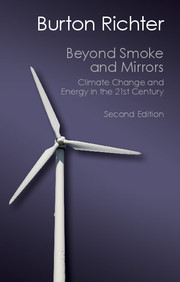1 - Introduction
Published online by Cambridge University Press: 05 November 2014
Summary
The First Edition
Our planet’s atmosphere has been the dumping ground for all sorts of gases for as long as human history. Its capacity is large, and when those using it as a dump were few there was no problem. There are now more than seven billion of us, and we have now reached the point where human activities have overloaded the atmospheric dump and the climate has begun to change. The United Nations population group projects that there will be 10.5 billion by 2100. Our collective decision is what to do about it. Do we do nothing and leave the problem to our grandchildren who will suffer the consequences of our inaction, or do we begin to deal with it? It is much easier to do things now rather than later, but it will cost us something.
To me the answer is clear: we should start to deal with it. This book describes the problem and the alternatives that exist to make a start on limiting the damage. This is not an academic book, even though I am a physics professor. It is written for the general public. True, it does contain some scientific details for those interested in them, but they are in technical notes at the ends of chapters; you can skip them if you like.
The title of the book, Beyond Smoke and Mirrors, can be taken two ways. One is what future energy sources might replace coal and today’s versions of solar power. The other is the real story behind the collection of sensible, senseless, and self-serving arguments that are being pushed by scientists, environmentalists, corporate executives, politicians, and world leaders. I mean the title both ways, and the book looks at the technical and policy options and what is really hiding behind the obscuring rhetorical smoke and mirrors. There are many ways to proceed and, unfortunately, there are more senseless arguments than sensible ones, and still more that are self-serving.
- Type
- Chapter
- Information
- Beyond Smoke and MirrorsClimate Change and Energy in the 21st Century, pp. 1 - 16Publisher: Cambridge University PressPrint publication year: 2014

